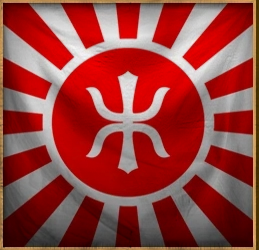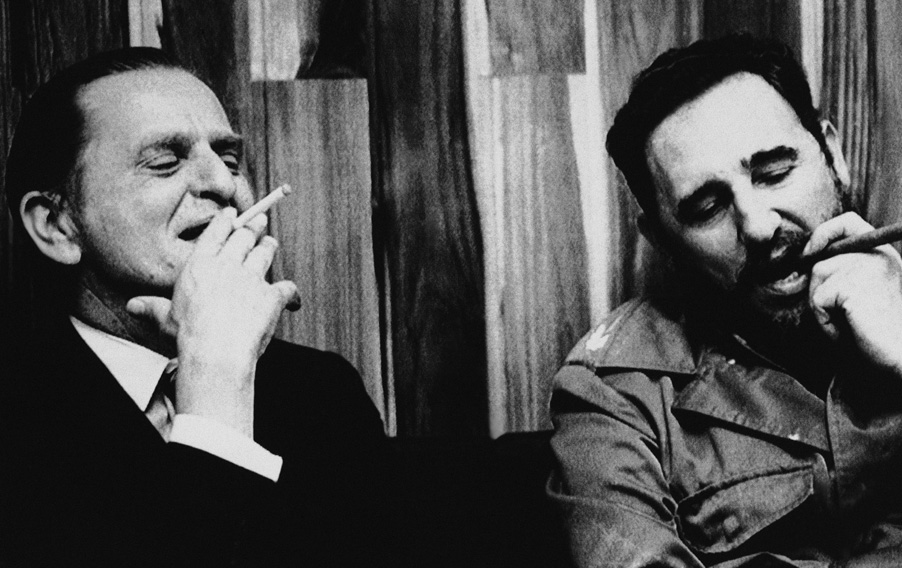"There have been as many plagues as wars in history; yet always plagues and wars take people equally by surprise" - Albert Camus
It's the year 1962. The world is in chaos and ruin. Ever since a strange disease emerged in rural Spain in 1942, the world has devolved into chaos. World War 2 ended gradually as nations collapsed, cities became abandoned, economies collapsed, and armies were decimated. Most of the world either collapsed, or had major government changes. Only some nations remain, and those that still exists, are shells of their formers selves. Can hope survive on this decaying world? Or will darkness and chaos prevail?
Although the disease has existed on earth for nearly 20 years, not much is still known about it. But what is known is its symptoms, mortality rate, and it's effects on Human Civilization. It all started in February 25th, 1942 when an unknown aircraft entered airspace over Los Angeles, California. Right before it was shot down however, it fired an unknown projectile. It landed all the way in the small town of Cincovillas in Spain. Patient Zero is believed to be a farmer in the area. From there, it spread across Spain, soon crossing over the French and Portuguese borders. Even worse, it happened during what was the largest war the world has ever seen. Armies were decimated, the disease went global, and hundreds of millions of people died. Europe was the worst hit region in the world, and Spain, the worst hit country. Asia, Africa, and South America were also hit hard by the virus. North America and Australia were the least affected continents, resulting in a somewhat better standing as of 1962.
The disease itself is quite nightmarish. It causes flu-like symptoms, but the alien microbe does its damage by altering the DNA of whatever it infects, be it a plant, human, bird, etc. Most of the mutations lead to increased cancer risk, which kills 75% of infected humans. Around 23-24% survive with no deadly affects, some minor changes like increased intelligence, strength, speed, etc might occur, but nothing too horrifying. However, 1-2% of infected humans mutate to the point where they're considered "mutants". Most mutants no longer resemble the people they once were. Not all of the mutants are the same, but around 300 varieties are known to exist. The mutants were thought to be only threatening for their large numbers, but the failed West Russian Liberation War proved that the mutants had more intelligence and ability to cooperate than previously thought. Mutants still inhabit and dominate parts of the world. While most of the world sees the mutants as monsters, sometimes the true monsters lie within what remains of the world.
The German Reich
"My honor is my loyalty" - Heinrich Himmler
Ever since the mutation plague reached Germany in the Spring of 1942, Germany has been thrown into disarray. The war stagnated, and its enemies collapsed. The Wehrmacht was decimated by the disease as it spread. It eventually climaxed when Hermann Goering mutated in 1946, leading to a wave of suicides among high ranking Nazi officials. Heinrich Himmler, seeing an opportunity, used his Schutzstaffel to launch a coup against the failing Reich. Many of the Reich's non-German territories either collapsed, or declared independence from the Reich. Germany has not reconquered these lands due to the Wehrmacht being weak, and Himmler's inward focused policies. It does still maintain two puppet states however. The Ordenstaat Bohemen, lead by Reinhard Heydrich, and the Reichskommisariat Polen-Litauen, lead by Odilo Globocnik. The current German Reich and its puppets are very secretive, but follow Himmler's views of an Aryan Spartanist Dystopia. Czechs, Poles, and Lithuanians are nearly extinct in the Reich's territories, either being exterminated, enslaved, or fleeing to the Balkans, Scandinavia, Russia, or even as far as America, causing an ongoing refugee crisis in Eastern Europe. Himmler's ideology, commonly known as Aryanism has secret plans behind it. Himmler and his inner circle plan for what will eventually be, their final act. Thermonuclear extermination of the undesirables, and the creation of a so-called "Pure Aryan World." The World has yet to see Himmler's true plans, but it seems like his reign of terror will only spread Across Europe.
The Black Sun dawns over Europe, determined to set the continent alight.
The United States of America
"The soldier above all others prays for peace, for it is the soldier who must suffer and bear the deepest wounds and scars of war" - General Douglas MacArthur
The United States, after the virus started to spread across Europe, closed its borders to all other nations. But infected fish off the coast of North Carolina brought the Mutation Plague to the United States in October 1945. A Japanese-American Armistice was signed in March of 1946, after the Japanese Emperor succumbed to the disease. Due to military preparedness, The United States was not hit as hard as most countries, but things still went south for America. In June of 1947, President Truman, being desperate to slow down the disease, ordered the air force to drop two atomic bombs over the heavily infected New York City. This was the final straw. Riots erupted across America. In an attempt to restore law and order, a clique of Generals led by Douglas MacArthur launched a coup against Truman. The coup succeeds, Truman is executed, and Marshall Law is declared across the US. The virus slowly fades as military crackdowns and curfews reduce cases. America had survived, but had lost its liberty. MacArthur's health is rapidly declining. His death is inevitable. Multiple Generals and Admirals are now vying to be his successor. The main candidates are Admiral Chester Nimitz, a MacArthur loyalist, and General Omar Bradley, a reformist who wants to restore civilian rule. But there are other factions, ready to rebel when MacArthur kicks the bucket. Ranging from Fascist, to Communist, to Democratic, to Socialist, and others. Racial tensions are increasing as the Military Junta enforces segregation upon the country. America's future is uncertain, but is sure to lead to chaos.
America shall follow General MacArthur into the grave.
The Soviet Wastes
"The death of one man is a tragedy. The of millions is a statistic." - Joseph Stalin
When the plague first entered Russia, it at first seemed like a blessing, as the Wermacht were crippled. However, by 1946, the plague was devastating Western Russia. Stalin died from disease complications in 1946, causing the collapse of the Soviet Union into a series of warlord states. By 1950, Western Russia was overrun by the mutated. In a desperate attempt to retake Moscow, a massive partisan attack led by the West Russian Revolutionary Front began in 1951. The front eventually broke in 1954 as the Mutated seemed to work together against the Russian attackers, also proving that the mutated had higher levels of coordination and intelligence than previously thought. Various factions have popped up in the wastes of Russia. Whether it's the Leninist Vanguards of Buryatia, the WRRF loyalists of Arkhangelsk, the Monarchists of Kirov and Zabaykalsky, the Fascists of Amur, the former German collaborators of Samara, the unstable Democracy of Komi, the Pagan Theocrats of Perm, the crap ton of Generals, or any of the other factions, Russia has a chance of reunifying. Whoever reunites Russia will have to face the ultimate task of reclaiming Moscow, and Western Russia as a whole, from the mutants who roam the wastes.
Can reason survive in the wastes of the shattered union?
The Rest of the World
"What silence rules the ghostly hours that guard the close of human sleep." - George Sterling
The rest of the world has suffered immensely. The island of Britain has fallen into a series of warlord states, as has Northern France. Iberia, Southern France, Northwest Italy, Morocco, Italy's Colonial Empire, the Amazon, much of Central Africa, Afghanistan, Greenland, and areas surrounding Mexico City, Beijing, and Shanghai have fallen into anarchy, or have been overrun by the mutated. Japan's Empire has fallen. Korea and Southeast Asia are independent, while the Japanese islands have fallen into warlord states. China has mostly unified under Mao Zedong's Chinese Soviet Republic. Former British Raj has fallen into endless civil war. Most of Mexico, Central America, much of South America, and much of Africa has fallen into warlord states. The royal family fled to Canada. Other remnants of the British Empire exist such as the West Indies, the Gold Coast, Nigeria, Singapore, Australia, New Zealand, and Ceylon. What remains of France only exists in West Africa and Oceania. The Balkan nations, especially Yugoslavia are on the verge of collapse. The Baltic States, Scandinavia, and Benelux once again face the prospect of German invasion. Vietnam is under the Communist rule of Ho Chi Minh. The Middle East is dealing with ethnic tensions as Colonial possessions gained independence. Whatever is left of these nations may one day become new powers should they play their cards right in this dark age.
In this darkness, some will thrive, others won't.
1: The OPs word is law.
2: Technology has stagnated, so think 1940s tech instead of 1960s tech.
3: No glorification of mass atrocities.
4: Any disputes between players should be brought to me.
5: The progression of time is 1 month per page.
6: Every IC post must be at least 3 paragraphs long.
7: No godmodding or meta-gaming.
8: No bad grammar.
9: February 1942 is the point of divergence.
10: No matter how dark this world is, have fun.
Nation App:
- Code: Select all
[align=center](Delete all in parentheses)
[b]NS Name:[/b]
[b]Official Nation Name:[/b]
[b]Unofficial Nation Name:[/b]
[b]Flag:[/b]
[b]Head of State:[/b]
[b]Head of Government (If not the same as Head of State):[/b]
[b]Capital:[/b]
[b]Territory:[/b]
[b]Ideology:[/b]
[b]Ruling Party or Force:[/b]
[b]Government Description (at least 2 paragraphs):[/b]
[b]Economic Description (at least 2 paragraphs):[/b]
[b]Foreign Relations Description (at least 2 paragraphs):[/b]
[b]Short-term Goals:[/b]
[b]Long-term Goals:[/b]
[b]History Since 1942:[/b]
[b]Armed Forces Name:[/b]
[b]Army Name and Size:[/b]
[b]Navy Name and Size (if it exists):[/b]
[b]Air Force Name and Size (if it exists):[/b]
[b]Other Military Branches (if they exist):[/b]
[b]History Since 1942:[/b]
[b]Other Information:[/b]
1942 TRACKING PURPOSES[/align]
Faction App:
- Code: Select all
[align=center](remove all in parentheses)
[b]NS Name:[/b]
[b]Faction Name:[/b]
[b]Type of Faction(Paramilitary, Political Party, Group of Wasteland Bandits, etc):[/b]
[b]Ideology:[/b]
[b]Flag or Symbol:[/b]
[b]Leader:[/b]
[b]Where Does It Operate?:[/b]
[b]How Does It Operate (1 to 2 Paragraphs):[/b]
[b]History Since Founding:[/b]
[b]Number of Armed Members (If Any):[/b]
[b]Other Information:[/b]
1962 TRACKING PURPOSES[/align]





 I'm not completely abandoning the idea yet, but it would of course be fun to play a faction with a little more power.
I'm not completely abandoning the idea yet, but it would of course be fun to play a faction with a little more power.


